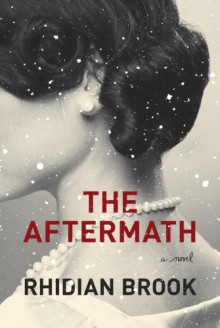
World War II, which historian Max Hastings called "the greatest and most terrible event in human history," will never fail to be a subject that fascinates historians, novelists and readers. Lately, though, it seems that the immediate aftermath of the war has caught writers' interest. Just off the top of my head, I can think of these books: Tony Judt's Postwar, William I. Hitchcock's The Bitter Road to Freedom: A New History of the Liberation of Europe, Ian Buruma's Year Zero: A History of 1945, and, on the fiction side, John Lawton's wonderful Then We Take Berlin.
Rhidian Brook joins this group with his new novel, Aftermath, set in Hamburg. Hamburg, once a vital port city, in 1946 is another wrecked city in the German landscape, with bodies still buried under mounds of bombed-out husks of buildings, defeated Germans devoting all of their waning energy to finding food and cigarettes whatever way they can, and the conqueror Allies trying to figure out how to build a foundation for a new country on this blasted wasteland with these fragile people.
British officer Colonel Lewis Morgan is assigned a large, palatial house, but he is still enough of an idealist that he doesn't want to have its current residents turned out. And so, when his wife Rachael arrives, with their son Edmund, she finds that they are sharing living quarters with Stefan Lubert, an architect, and his daughter, 15-year-old Freda. For Rachael, this is discomfiting. The Morgans' oldest son was killed in her presence by a stray bomb and she is less kindly disposed toward Germans. Still, she is emotionally affected by seeing that so many Germans also lost their lives in bombing and she accepts the presence of the Luberts in the house––so long as they stick to their quarters.
There are parallels between the Morgans and the Luberts. Frau Lubert was killed in a British bombing raid, which leaves Stefan Lubert mourning and Freda filled with hostility. It seems that Rachael and Stefan almost need each other, and that Freda and Edmund's need to coexist in the house also plays out as a parallel to the rocky road to reconciliation between the Germans and Allies.
While Brook paints an evocative picture of war-ruined Hamburg, he is less successful with his characters. Maybe it's that famous British reserve, but I never got much of a feel for Lewis, Rachael or Stefan. That improved as the book neared its end, but by then it was too little, too late.
Brook's writing is often beautiful, but there are also some awfully clunky moments, such as when he uses the language of today, not the 1940s. The dialog used for the street kids is just plain bizarre; it sounds like what Ring Lardner might have used for the characters in Guys and Dolls if he'd been German.
There is also a film of this story in the works, and I wouldn't be surprised if it ends up working better than the book. The scenery should be striking, acting skills may make up for some of the character deficiencies on the page, and we can hope that the awkward places in the novel's writing will be absent in the film's script. In the meantime, though, if you're interested in a crackerjack story of postwar Germany, I recommend John Lawton's new Then We Take Berlin.


 Log in with Facebook
Log in with Facebook 







